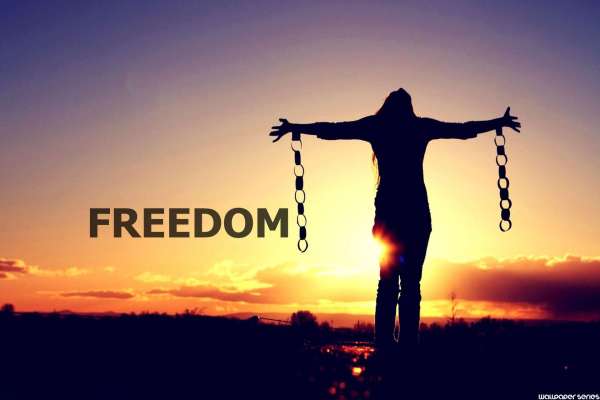The quest for true freedom is an inherent aspect of the human experience, a journey that transcends geographical, cultural, and temporal boundaries. In the context of Bahá’í teachings, freedom encapsulates not merely the absence of oppression or limitation but a profound understanding of oneself and one’s spiritual purpose. This inner awakening serves as the pivotal gateway to experiencing and manifesting true freedom. As seekers of truth navigate the waters of existence, they often encounter profound revelations that illuminate the path toward fulfillment.
At the heart of Bahá’í teachings lies the notion that each individual possesses an intrinsic divine essence. This essence, akin to a hidden treasure, awaits discovery through self-examination and reflection. Absurdity may cloak the soul in ignorance, yet the conscious effort to unveil the layers of personal identity fosters enlightenment. The metaphor of peeling layers from an onion embodies this undertaking; each layer represents societal expectations, preconceived notions, and transient desires that obscure one’s true self. Paradoxically, as one strips away these layers, vulnerability paradox opens the door to authenticity and spiritual awareness.
In embarking on this journey, it is essential to engage in rigorous introspection. Individuals must confront the multifaceted nature of their identity—roles defined by culture, family, and social constructs often cloud the deeper understanding of oneself. By transcending these superficial identities, individuals can access their spiritual purpose, akin to unlocking a door that leads to a vast, uncharted realm. Spiritual purpose is the guiding star, a unique beacon that illuminates the path toward individual fulfillment and collective advancement. The Bahá’í view underscores that fulfilling one’s spiritual purpose contributes to the welfare of humanity as a whole, positing that true freedom is interwoven with service to others.
Moreover, Bahá’í teachings encapsulate the transformative power of love and unity. In the framework of spiritual freedom, love functions as both a catalyst for personal growth and a glue that binds humanity. As Bahá’ís recognize the oneness of mankind, they advocate for the transcending of prejudicial barriers—whether based on race, religion, or nationality. This collective consciousness amplifies individual spiritual journeys, as each person’s growth contributes to the establishment of a harmonious global society. The process of self-realization thus becomes a shared odyssey; the liberation of the individual fortifies the liberation of humanity.
This concept can be illustrated through the metaphor of a garden. Each person is akin to a unique flower, thriving in distinct conditions yet interconnected in the intricate ecosystem of life. Just as a garden flourishes through diverse plants, the richness of human experience is accentuated by the diversity of perspectives and insights. Thus, true freedom encompasses a dual mission: the pursuit of self-knowledge and the cultivation of harmonious relationships within the garden of humanity. As individuals nurture their spiritual growth, they inherently contribute to the flourishing of unity, fostering a collective experience steeped in mutual respect and understanding.
No discussion of true freedom in Bahá’í teachings can omit the role of education. Knowledge serves as the key that unlocks the door to personal liberation. The pursuit of knowledge—both spiritual and material—empowers individuals to grasp their divine potential. The Bahá’í teachings emphasize that education is a fundamental right and a necessity for all, regardless of gender or socioeconomic status. The transformative power of education helps individuals unearth their capabilities, enabling them to assume an active role in their own liberation. By fostering critical thinking and self-reflection, education propels individuals to recognize their spiritual purpose and engage with the broader community meaningfully.
Furthermore, the Bahá’í teachings espouse the significance of consultation as a means of achieving collective freedom. Consultation—a collaborative method of decision-making devoid of personal agendas—encourages individuals to express their thoughts transparently while remaining receptive to diverse perspectives. Such dialogue fosters the emergence of a unified vision, illuminating the path toward collective spiritual and material advancement. Herein lies a profound truth: through collective engagement, individuals experience a richer understanding of themselves and others, furthering their journey toward true freedom.
As one navigates the complexities of self-discovery and spiritual awakening, patience and perseverance emerge as vital components. The journey towards true freedom is not linear; it ebbs and flows, often requiring resilience in the face of adversity. The Bahá’í teachings remind seekers that trials encountered along the path serve as opportunities for growth and refinement. As polished stones emerge from rough landscapes, so too do individuals evolve through their experiences, achieving deeper self-awareness and a clearer understanding of their spiritual purpose.
In conclusion, the Bahá’í perspective on true freedom intricately weaves the themes of self-knowledge, unity, education, and resilience into a cohesive narrative. The journey toward understanding oneself and fulfilling one’s spiritual purpose is a lifelong endeavor, illuminated by the virtues of love and service to others. To engage in this journey is to embark upon an odyssey of discovery, where each revelation not only tightens an individual’s bond with the divine but also reinforces their connection with the tapestry of humanity. Ultimately, true freedom lies not merely in personal liberation but in the conscious enactment of this freedom for the betterment of all. Dietrich Bonhoeffer once articulated the essence of freedom when he suggested that freedom is not merely the ability to do as one pleases; true freedom emerges from becoming who one is meant to be. Thus, the Bahá’í journey calls individuals to transcend the confines of parochial existence and embrace a life illuminated by purpose, authenticity, and an unwavering commitment to the collective well-being of all.
